|

Edward Seago
b. March 31, 1910
_______________________
Excerpts from Due North
Peter Riley
Intercapillary Space
(....)
Smoke standing over the houses in the valley below
we tempered ourselves into an ecstasy of forgetting
and farmed ourselves into the next generation
and rolled down the hillsides to the town
to set up shops, and ache with servility when the man
calls in to take away the profit. Consolation starts to slide
into counsel, tragedy into accident.
And where there was a local consolidation is now
a subsidised circus. Our old romances return
freshly laundered on the backs of migrant workers
from former colonies and recent war zones.
(....)
So the final descent into madness and death
is down a Pennine hillside, leaping small streams hung
with elder and hawthorn chest pain image pain stumbling
over tufted meadows down cinder tracks, vetch,
ragged robin, cow-parsley, dandelion, speeding
between hedgerows into the edges of the town the
garden fences the meeting places the towers, then
to slow and stagger panting and fall silently
across the threshold of the public library in all the gladness and relief
of total incomprehension.
...(more)
Intercapillary Space
_______________________
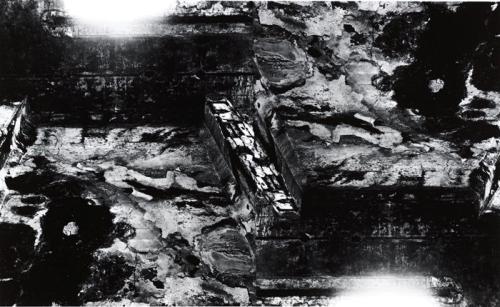
Atomic Dome, Ceiling, Stain of Blood
from the series The Map
Kikuji Kawada
Works by Kikuji Kawada
San Francisco Museum of Modern Art
_______________________
A few thoughts on The Map
Joerg Colberg
(....)
There is no such thing as a map in The Map. Or rather, there are lots of maps, but they aren’t the kinds of maps you would expect. They are images of the walls of Hiroshima’s Atomic Bomb Dome, which resemble maps. If you try to use these images as maps you will inevitably get lost - and therein I see their purpose.
Over the past decade we have moved ever more into a binary world, where there are two positions for everything, inevitably one being “good”, the other one being “bad” (or even “evil”). This wouldn’t necessarily be so bad if we weren’t refusing to realize that you cannot make sense of the world this way. There is an infinity of grey tones in between the black and white that we are so used to; for most problems there are no simple solutions, in fact for some problems there are no good solutions at all. Some problems will inevitably carry with them a combination of “good” and “bad”.
This is how The Map works. It takes you down a path and then lets you wander off, to arrive anywhere you will arrive. Even though the book is centered on the destruction of Hiroshima, it presents all the different aspects that had something to do with it. Everything is brought together, fused together, mashed up - not just metaphorically, but also visually: Images of the dome, photos of metal scraps, articles by kamakazi attack corps, the flag of Japan, TV sets, a Coca Cola ad, bottle caps… And everything literally unfolds before your own eyes: You open up an image by unfolding the outer two parts; and when you have taken it in, your own folding it back together (so you can turn the pages) brings the image back to its original, hidden state.
...(more)
_______________________

Meteorites and moon shadows:
Kikuji Kawada's brooding sky – in pictures
Kikuji Kawada The Last Cosmology
guardian
_______________________
Japanese Photography in 2015: the Master List
Stacy Platt
The Space In Between
This is a great moment for Japanese photography connoisseurs and enthusiasts. For a long while now, photographic japanophilia was an interest that had to be nursed solely with foreign book purchases, the rare North American exhibition (or the less-rare European one), and abundant, if limited, use of google translate. If you’re an English speaker for whom Shinjuku, Japan is as far away as Mars, 2015 might just be the year that Japanese photography comes to you. There is an unprecedented number of events, exhibitions, publications and unclassifiable wonderfulness related to Japanese photography that is in explosive abundance this year. While those in the European photo scene have been in-the-know for some time now, it would appear that Japanese photography is having its moment stateside.
...(more)
_______________________
Embodied Self: The New Causal History, Part I
Gregory Jones-Katz reviews Lynn Hunt, Writing History in the Global Era
In her compact book, Lynn Hunt—esteemed historian of the French Revolution and innovative practitioner of the “new cultural history”—considers how historians have approached their discipline and reflects on the emergence of global history, specifically the use of globalization as an explanatory historical framework. Hunt’s book, not least because of her crisp and engaging prose, has ambitions beyond an introductory text. Her text also hopes to challenge the assumptions behind the discourse of globalization, the discourse that might turn out to be the reigning orthodoxy of the historical profession during the early twenty-first century. She asks: “Is globalization the new theory that will reinvigorate history? Or will it choke off all other possible contenders, leaving in place only the inevitability of modernization of the world on the Western model?” Writing History’s persuasive answers to these timely questions will give pause to historians who are perhaps too comfortable with globalization talk. The text is a compelling ideology-critique, unearthing the presuppositions of many studies of global history in order to uncover the principles with which many of my generation learned to read and write history.
...(more)
_______________________
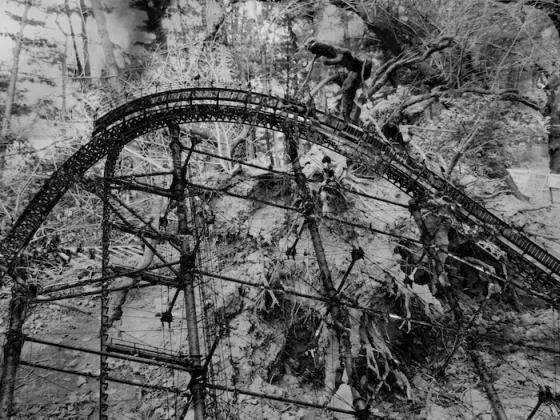
2011, Tokyo, Typhoon
Kikuji Kawada
2011-phenomena
Fraction Magazine
_______________________
After Vallejo
(Theme and variations)
Conor Kelly
Cleaver
I
I shall die, César Vallejo wrote,
in Paris on a day of heavy showers,
on a day I already remember,
a Thursday, perhaps, and in the autumn.
He died in Paris, true; but in the spring—
Good Friday, April 15 1938.
As to whether or not it rained on those roads
he ceased to feel, alone, I cannot recall.
César Vallejo is dead (of a strange disease).
Everyone kept on hitting him for no good cause.
They hit him hard with a cane and hard,
as well, with a rope; his testament:
the body blows of life, the shoulder pain,
the solitude, incessant rain, the roads…
...(more)
_______________________
Sixteen Songs About a Ship of Fools
Levi Asher
Literary Kicks
Ship of Fools, the Enduring Metaphor
Levi Asher
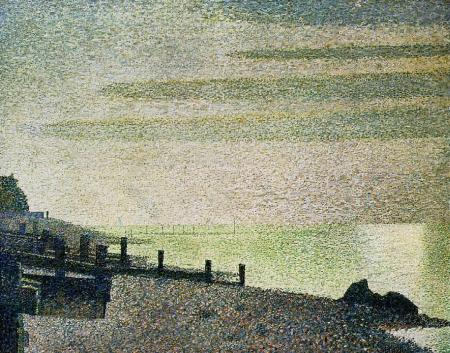
Evening at Honfleur
1886
Georges Seurat
d. March 29, 1891
_______________________
Sorrow Gondola
Tomas Tranströmer
Translations by Patty Crane
blackbird
Nightbook Page
I stepped ashore one May night
into a chilly moonlight
where grass and flowers were gray
but their scent green.
I drifted up a slope
in the colorblind dark
while white stones
signaled back to the moon.
A time span
several minutes long
fifty-eight years wide.
And behind me
beyond the lead-shimmering waters
was the other coast
and those in command.
People with a future
instead of faces.
...(more)
_______________________

Tomas Tranströmer
1931 - 2015
"No poet expresses better the drift between now, then, and eternity; the sadness at the heart of nostalgia. No poet expresses better the relationship between humans and the natural world. The black and melancholy seas, the drifting seagulls, the oaks and elks, the storms, rowanberries, the moon and stars, the well, salt, and wolves are agents rather than background; they are what the world is, as much as we are. It’s dark, and thoughtful. It is, also, bleakly intelligent."
- Sigrid Rausing
Ten poems by Tomas Tranströmer
translations by Robert Bly
_______________________

Basil Ulitin
1926
via
_______________________
from Where the Bird Sings Best
Alejandro Jodorowsky
Translated from the Spanish by Alfred MacAdam
bomb
(....)
They forgot Hebrew and used a limited Spanish of only a hundred words. The great cats learned most of those words and in turn taught their trainers an extensive range of growls. When rehearsals or shows ended, after dinner, at midnight, in the intimacy of the great cage, humans and animals would sit face to face to stare fixedly into one another’s eyes. In those moments, the lion was the teacher. It was he who was there, present, concentrating, with no interest in the past or the future, united with totality. In his animal body, the divine essence became palpable. The lion taught the Arcavis about economy of gestures, strength in repose, the pleasure of being alive, authenticity of feeling, obedience of oneself. Finally, seeing the nobility of the beast, his majestic inner solitude, they understood why Jacob compared Judah to a lion.
The Kabbalist rabbis of Toledo understood that a new form of biblical interpretation had been born. In silence, with the greatest respect, they entered the cage protected by the miraculous touch of Salvador’s hands. They meditated, staring into the lion’s eyes. They asked permission to bring their brothers in study, and with them came handsome old Arabs dressed in white and pale Catholic monks with sunken, burning eyes. The Koran, the Torah, and the Gospels were eclipsed by those imposing beasts, capable of standing so still that fireflies fleeing from the cold dawn rested on their warm skin, transforming them into phosphorescent statues.
(....)
The mystics from the three religions continued meditating opposite the lions. The years passed. The political situation changed. Hordes of fanatics began to burn the ghettos. The mystics stopped visiting. The wagons of the lion tamers passed through cities where converted Jews, sentenced to death by the Inquisition, were burning. The thriving communities became sad streets walked by dark rabbis, as circumspect as shadows.
...(more)
_______________________
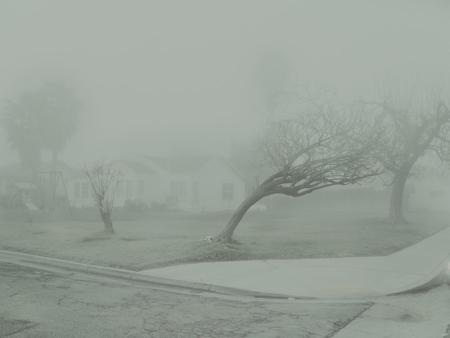
Heikki Kaski _______________________
Delirium, Dissolution and Disaster: Heikki Kaski’s “Tranquillity”
The Great Leap Sideways
(....)
The book Tranquillity exists because of the name of the town in which the photographs it comprises were ultimately made, and because that town lay within driving distance of Los Angeles, where Heikki Kaski was living in 2012. Tranquillity exists, that is, as a pure function of random curiosity at the possible nature of a place so strictly and insufficiently defined by such a specific name. In this the work shares in the west coast conceptual history of testing nominal meanings against the matter of place, and the imaginative license of art. Moreover, in this the work reincorporates the mythical function of the state of California as the seedbed for new imaginings of the future, and the end point for migration and escape.
As it is photographed, Tranquillity, CA seems a place at once expansive and miniaturised, remote and explosive, intoxicating and arid – a satellite array rather than a stable essence, whose changeable nature is reflected in the liberal mixture of pictorial forms which characterise the book itself. The breadth of the flat desert horizon seems to distort those figures that punctuate it, even as the depth of the view miniaturises man-made effort into ultimate obsolescence. Tranquillity has the air a distant and forgotten outpost, neglected and abandoned with the dismantling of the rails: a Tombstone of pre-industrial struggles for feudal power and mercantile prosperity, or an innocuous desert mirage into which one might easily disappear.
(....)
In retracing multiple facets of the conceptual lineage from which such work flows, we might also engage a timely possibility increasingly visible in the modern photobook: that contemporary photography’s reflexive disassembly of its generic codes is of a piece with our waning sense of confidence in any unified strategy of control, and that beneath our nominal systems for distributing meaning, sensory experience and historical value lies an abyss toward which we now travel at greater and greater speed. In this sense, Tranquillity is not only a sort of Tombstone town relic of a distant pre-industrial past, it is a modern disaster movie of the type we continually see each summer writ large across the silver screen, and thus the work’s currency, its poetry and its visceral special effects are bound up with an unspoken terror at the probability of our own demise.
“The image, present behind each thing, and which is the dissolution of this thing and its subsistence in its dissolution, also has behind it that heavy sleep of death in which dreams threaten.”
— Maurice Blanchot “The Two Versions of the Imaginary” from The Space of Literature (1955) ...(more)
_______________________
Below Freezing
Tomas Tranströmer
translated by Robert Bly
We are at a party that doesn’t love us. Finally the party lets the mask fall and
shows what it is: a shunting station for freight cars. In the fog cold giants
stand on their tracks. A scribble of chalk on the car doors.
One can’t say it aloud, but there is a lot of repressed violence here.
That is why the furnishings seem so heavy. And why it is so difficult to see
the other thing present: a spot of sun that moves over the house walls and
slips over the unaware forest of flickering faces, a biblical saying never set
down: “Come unto me, for I am as full of contradictions as you.”
I work the next morning in a different town. I drive there in a hum
through the dawning hour that resembles a dark blue cylinder. Orion hangs
over the frost. Children stand in a silent clump, waiting for the school bus,
the children no one prays for. The light grows gradually as our hair.
_______________________

Georges Seurat
_______________________
A Programme of Texts by Tomas Tranströmer
Nobel Lecture December 7, 2011
Alone
Tomas Tranströmer
I
One evening in February I came near to dying here.
The car skidded sideways on the ice, out
on the wrong side of the road. The approaching cars –
their lights – closed in.
My name, my girls, my job
broke free and were left silently behind
further and further away. I was anonymous
like a boy in a playground surrounded by enemies.
The approaching traffic had huge lights.
They shone on me while I pulled at the wheel
in a transparent terror that floated like egg white.
The seconds grew – there was space in them –
they grew as big as hospital buildings.
You could almost pause
and breathe out for a while
before being crushed.
Then something caught: a helping grain of sand
or a wonderful gust of wind. The car broke free
and scuttled smartly right over the road.
A post shot up and cracked – a sharp clang – it
flew away in the darkness.
Then – stillness. I sat back in my seat-belt
and saw someone coming through the whirling snow
to see what had become of me.
II
I have been walking for a long time
on the frozen Östergötland fields.
I have not seen a single person.
In other parts of the world
there are people who are born, live and die
in a perpetual crowd.
To be always visible – to live
in a swarm of eyes –
a special expression must develop.
Face coated with clay.
The murmuring rises and falls
while they divide up among themselves
the sky, the shadows, the sand grains.
I must be alone
ten minutes in the morning
and ten minutes in the evening.
– Without a programme.
Everyone is queuing at everyone's door.
Many.

Scholastica
M. C. Escher
1931
_______________________
Two by Ingeborg Bachmann
Translated by Joan Harvey
DM du Jour
A Kind of Loss
Shared: seasons, books, and music.
Keys, teacups, the breadbasket, linens and a bed.
A dowry of words, of gestures, carried along,
used up, spent.
House rules followed. Said. Done. And always
the extended hand.
In winter, in a Viennese septet, and in summer
I have been in love.
With maps, in a mountain hut, on a beach
and in a bed.
A cult made up of dates and irrevocable promises,
enraptured before something, reverent over nothing.
( — to the folded newspaper, the cold ashes, the note
on a piece of paper)
fearless in religion, for the church was this bed.
From the sea view came my unstoppable painting.
From my balcony I greeted the people, my neighbors, below.
By the open fire, in safety, my hair took on its deepest color.
The doorbell’s ring was the alarm for my joy.
It is not you I have lost,
but the world.
...(more)
DM du Jourbon mots, gallimaufry, and coloratura macabrely _______________________
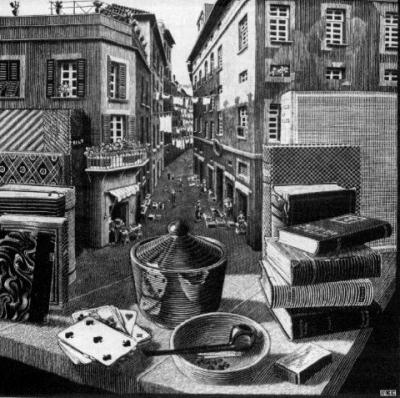
Still Life and Street
1937
M. C. Escher
d. March 27, 1972
_______________________
Draft 111: Arte Povera
Rachel Blau DuPlessis
alligator zine
(....)
4.
Suppose after all this, one just listed
house, book, mug, window,
daughter, dogs (gone), desk, Apple ™.
Suppose it was budded tree limb, hair-thread fingers—
the baby oak in spring, rain “heavy at times,”
and the cleared branches of fall, suppose
yellow gusting in a greeny-pinkish light,
a dark red pear leaf blown into the room,
suppose a salvaged shmoo-like basil plant
eager, even in winter, to give pesto,
or a fondness, a warmth, eros
blue as the sky, could it be otherwise?
the apt healing of a wound, even with
its startling scar—
unaccountable enumerations:
the oddly glistening, the half-started language.
The half-startled. Twisting together
choice exemplars of exquisite debris:
“a cigar label, a metal buckle, a ballpoint pen,
a bottle cap, a bolt, a hair curler,
a drafting compass, a plastic bottle,
yellow tape, aluminum foil, drinking straws,
green paper,
broken blue glass.”
5.
Would this be enough?
What would be enough?
It is never enough.
The task is unfinished,
the persons, unfinished.
The structure is unfinished.
Verso becomes a promise to turn back.
The sum total of “old furniture, planks and upside-down drawers, cardboard cutouts,
scraps of insulation board, discarded light bulbs, jelly glasses, flower vases, hollow cardboard cylinders,
mirror fragments,” with foil sheets of gold and silver covering it all.
...(more)
_______________________

Curfew Hour
1882
Albert Pinkham Ryder
March 19, 1847 - March 28, 1917
_______________________
Holding On
Richard O. Moore
1.
How account
for dimming
of the lights
baggage
of old age
tagged and waiting?
or light tricks
in snow
at sun-up?
waiting in line
waiting in line
come sundown
watching the horizon
eyes glowing.
2.
Who
not the
other myself
my prisoner
night flesh
ear-skewered
music
in natural
air
screams well-deep
seep to the brain-root
days
Treblinka nights
guilt
guts the ferret
in my cage
sanity puddles the floor.
3.
In memory sickness
eyes unlace
open
as last night’s boots
a glacier of light
saps the air
remember
the torturer’s
tinnitus
starts the day.
...(more)
Homage to Richard O. Moore (1920-2015)
Garrett Caples
Particulars Of Place
Richard O. Moore
Edited by Garrett Caples, Paul Ebenkamp, and Brenda Hillman
with an introduction by Cedar Sigo
"The last living member of the original circle of Anarcho-pacifist poets around Kenneth Rexroth, at the birth of the San Francisco Renaissance in the 1940s, Richard O. Moore published his acclaimed first book of poems, Writing the Silences (California, 2010), at age 90. Now Omnidawn presents his second book, Particulars of Place, largely comprised of work written over the ensuing five years. The title poem is an ambitious meditation on life in the twilight of American Empire, posing the question of how to live in an age of endless warfare. Other highlights include “Check Point,” an elegiac indictment of aerial bombing on behalf of its historical victims; a section of prose poems from his experimental sequence “d e l e t e”; “Apart from It,” an autobiographical tour de force ranging from his depression era orphanhood to “the climate change of old age”; and excerpts from Outcry, a poignant sonnet sequence on the poet’s recently received diagnosis of legal blindness. Throughout, his commitment to social justice mingles with his interest in Wittgenstein’s linguistic philosophy, resulting in a poetic amalgam unique to Moore himself. Reflecting a lifetime of devotion to the art of poetry, Particulars of Place confirms Moore’s paradoxical position as a newly emerging old master."
_______________________

Puddle
M. C. Escher
1952
_______________________
A Life
Richard (Thomas) Moore
1927 - 2009
(....)
But I have not considered human beings adequately as they are here nowadays: talk-show human beings for whom all problems have to be solvable. We deny the insolubility of problems as we deny death, secretly believing that we can and must live forever. The early Christians had little trouble, dealing with the earlier pagan writers with one conspicuous exception: Lucretius, whose great poem, De Rerum Natura, undertakes the proof that there is no life after death. All the other pagan writers are at least a little vague on the subject, but Lucretius is clear about it on every page and there is no getting around him. And worse still, he thought it was good news that he was bringing. Death will bring the end of each life at last. There will be nothing, nothing to fear, no damn eternity to deal with and puzzle over.
We descendants of Christianity, we creations of that book, The Bible, can't endure Lucretius' lush relish and appreciation of the sensuous life here on earth. Everything in our abstract, celluloid-charmed, computer-driven, and, above all, money-maddened lifestyle separates us from that life on earth.
(....)
The earliest life that I remember, when I was a dyslexic little boy who liked to keep worms in his pocket, has been reopening me to forgotten pleasures. Forgetting the worth and worthlessness of things allows me to commune with them. Eggshells, for instance, though they lack economic value, are a useful ingredient of fertilizer if you let them get dry and pound them into a powder. I love lavishing my time on them because my time is worthless. It's marvelous, I find, having one's time worthless.
...(more)
Richard Moore, Poet: Tribute and Memorial
A selection of Richard Moore's poems
with introduction and commentary by the author
_______________________
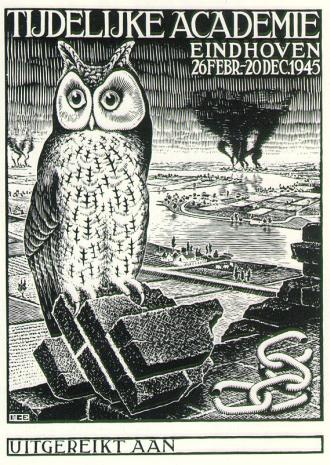
Temporary Academy Diploma
M. C. Escher
1945
_______________________
Try to forget.
Lauren Berlant
(....)
It’s all the rage to have impatience with ambivalence, but personality is our style of getting in the way of our own aims. Sometimes I wonder, Why do I bother talking, and then I laugh: life’s a racket. The mother’s, the teacher’s, the lover’s complaint is the content of everyone’s dread. Talking converts pillar into hydrant, word into police, touch into plots, person into a plastic clown statue that rocks and rights. I said some things to them: and then I saw that I was not just about to lose a lot of world, but had already lost it.
Sitting with the loss of the world requires a supple affective infrastructure, or a religion, which I reject, as I prefer not to be triangulated. If you’re a kind of thing whose lack of fit is endemic, if you sense that the bad life is impersonal and political while also overclose, it structures living as organically as anything about you, such as having had the trunk of your own body your whole life, stretching, bloating, twisting, holding you up, taking blows, manufacturing joys in the cracks, and being outlined by fabric that discloses so little that nakedness is always jolting.
...(more)

wheelbarrow and flower pots
1920
Edward Steichen
March 27, 1879 - March 25, 1973
_______________________
Last Things
William Meredith
For Robert Lowell
I
In the tunnel of woods, as the road
Winds up through the freckled light, a porcupine,
Larger than life, crosses the road.
He moves with the difficulty of relics—
Possum, armadillo, horseshoe crab.
To us they seem creatures arthritic with time,
Winding joylessly down like burnt-out galaxies.
In all their slowness we see no dignity,
Only a want of scale.
Having crossed the road oblivious, he falls off
Deliberately and without grace into the ferns.
II
In another state are hills as choppy as lake water
And, on a hillside there,
Is a junkyard of old cars, kept for the parts—
Fenders and chassis and the engine blocks
Right there in the field, smaller parts in bins
In a shed by the side of the road. Cows graze
_______________________
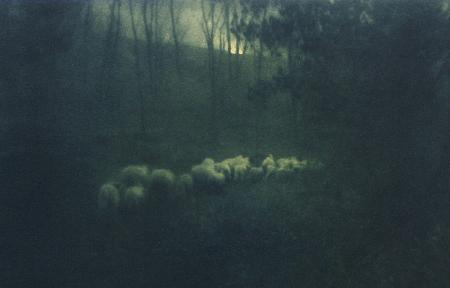
Pastoral Moonlight
Edward Steichen
1907
_______________________
Put simply, we should avoid the temptation of becoming memory snobs, as any of us could find ourselves downwardly mobile so far as memory goes.
The disrememberedDementia undermines all of our philosophical assumptions about the coherence of the self. But that might be a good thing
Charles Leadbeater aeon
(....)
Dementia raises deeply troubling issues about our obligations to care for people whose identity might have changed in the most disturbing ways. In turn, those changes challenge us to confront our philosophical and ethical assumptions about what makes up that identity in the first place. Everyone touched by the disease goes through a crash-course in the philosophy of mind.
(....)
Dementia is the newest form of identity politics which has remade how we think of race, sexuality, gender and disability. At the core of identity politics is the claim that people deserve equal recognition, despite being different in ways that turn out to be far less significant than first thought. That same insight now needs to be applied to people with dementia: their failing memories make them different, but they are not lesser people, with fewer rights. Their ‘difference’ should not be translated into ‘difficult’. Philosophy gives us a choice about how to understand this challenge as people in their hundreds of thousands are diagnosed with this condition.
Once the mind is invaded, all hope of maintaining a memory-based identity goes, and with that goes everything we value about the idea of independence and self-fulfilment. Living with dementia then becomes a long process of mourning someone who is no longer there. But if we understand our identity as something held by relationships, expressed through feelings, reflected by our environment and enacted bodily, dementia instead becomes a daily puzzle to find common ground with people different from us, and to find new, often non-verbal forms of communication and communion that make people feel good about themselves without necessarily knowing why.
...(more)
_______________________

Time-Space Continuum
Edward Steichen
1920
_______________________
America Politica Historia, in Spontaneity
Gregory Corso
b. March 26, 1930
O this political air so heavy with the bells
and motors of a slow night, and no place to rest
but rain to walk—How it rings the Washington streets!
The umbrella’d congressmen; the rapping tires
of big black cars, the shoulders of lobbyists
caught under canopies and in doorways,
and it rains, it will not let up,
and meanwhile lame futurists weep into Spengler’s
prophecy, will the world be over before the races blend color?
...(more)
_______________________
Communicative Capitalism
a response to Jodi Dean, Blog Theory: Feedback and Capture in the Circuits of Drive
McKenzie Wark
Public Seminar Commons
(....)
How can we even write books in the era of Snapchat and Twitter? Perhaps the book could be something like the tactic of slowing down the pace of work. Still, books are a problem for the era of communicative capitalism, which resists recombination into longer threads of argument. The contours of Dean’s argument are of a piece with this media strategy.
Dean offers “an avowedly political assessment of the present” rather than a technical one. The political – a term greatly expanded in scope and connotation across a half-century of political theory – becomes the language within which to critique the seeming naturalness and inevitability of the technical. But perhaps this now calls for a kind of ‘dialectical’ compliment, a critical scrutiny of the expanded category of the political, perhaps even from the point of view of techne itself. We intellectuals do love the political, perhaps on the assumption that it is the same kind of discourse as our own.
If industrial capitalism exploited labor; communicative capitalism exploits communication. It is where “reflexivity captures creativity.” Iterative loops of communication did not really lead to a realization of democratic ideals of access, inclusion, participation. On the contrary, it is an era of capture, of desire caught in a net and reduced to mere drive.
...(more)
_______________________
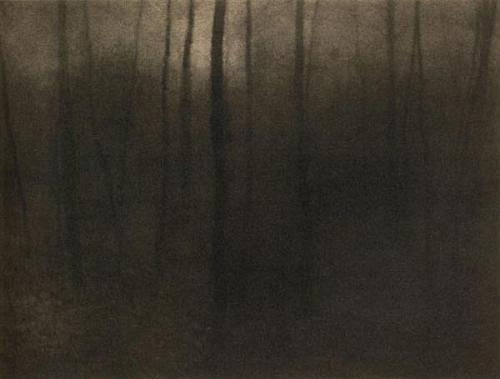
Woods, Twilight
Edward Steichen
1899
_______________________
A voice comes to one in the dark. Imagine.
Company [pdf]
Samuel Beckett
A voice comes to one in the dark. Imagine.
To one on his back in the dark. This he can tell by the pressure on his hind parts and by how the dark changes when he shuts his eyes and again when he opens them again. Only a small part of what is said can be verified. As for example when he hears, You are on your back in the dark. Then he must acknowledge the truth of what is said. But by far the greater part of what is said cannot be verified. As for example when he hears, You first saw the light on such and such a day. Sometimes the two are combined as for example, You first saw the light on such and such a day and now you are on your back in the dark. A device perhaps from the incontrovertibility of the one to win credence for the other. That then is the proposition. To one on his back in the dark a voice tells of a past. With occasional allusion to a present and more rarely to a future as for example, You will end as you now are. And in another dark or in the same another devising it all for company. Quick leave him.
Use of the second person marks the voice. That of the third that cankerous other. Could he speak to and of whom the voice speaks there would be a first. But he cannot. He shall not. You cannot. You shall not.
Apart from the voice and the faint sound of his breath there is no sound. None at least that he can hear. This he can tell by the faint sound of his breath. Though now even less than ever given to wonder he cannot but sometimes wonder if it is indeed to and of him the voice is speaking. May not there be another with him in the dark to and of whom the voice is speaking? Is he not perhaps overhearing a communication not intended for him? If he is alone on his back in the dark why does the voice not say so? Why does it never say for example, You saw the light on such and such a day and now you are alone on your back in the dark? Why? Perhaps for no other reason than to kindle in his mind this faint uncertainty and embarrassment.
(....)
.....................................................
From Jeff Fort, The Imperative to Write
Spurious
In this way, Company foregrounds equally the two dimensions of Beckett’s writing which make up the paradox I would like to discuss – formalizing abstraction and obtrusive affect, the ‘timeless void’, with its indeterminate blanks, and the time of life on earth – and it shows how these dimensions are inextricably linked in the language issuing from a narrative voice. And Beckett’s voices, despite their attenuation, are committed to being narrative voices: voices that tell stories and posit worlds in which events are said, however equivocally and indefinitely, to unfold in time. The repulsion of the subject and of a past thus draws into fictions that would be absolute, but that continually meet with the stuff of a singular time, on a scrambled border that divides ‘my own’ from the pure forms that make it possible.
Another way to pose this problem is to point out that, regarding the apparently forced synthesis of abstraction and affect in the preceding passage, for example, it is impossible to determine which of these two terms has priority – that is, which one was forced on the other. The passage suggests, as does most of Company, that an impersonal language drones on in a void and nowhere’ space, blankly and indifferently, determined more by a machinelike grammar than by anything like ‘experience’, injecting its tales with a perfunctory and artificial pathos.
But the fact that this droning language drones from a voice, and that each time it speaks it has a given source in a singular instance of language, entails its own inevitable structural implications. ...(more)
The Imperative to Write: Destitutions of the Sublime in Kafka, Blanchot and Beckett google books
_______________________

Milk Bottles
Spring New York
Edward Steichen
1915
_______________________
Humanity
Gregory Corso
What simple profundities
What profound simplicities
To sit down among the trees
and breathe with them
in murmur brool and breeze —
And how can I trust them
who pollute the sky
with heavens
the below with hells
Well, humankind,
I’m part of you
and so my son
but neither of us
will believe
your big sad lie

Philippe Schuller
Signatures Photographies
_______________________
Reading Ingeborg Bachmann
John Taylor looks at Malina, translated by Philip Boehm
Context N°13
... I daresay that few novels are further removed in style, narrative structure and philosophical scope from mainstream American fiction.
Reading Malina is like wandering deeper and deeper into a dark, pathless forest. With every step, the temptation is to turn back, yet something invisible and magnetic draws one relentlessly forward at the risk of getting hopelessly lost. And this is the point. As Bachmann explores the origins, manifestations, and consequences of the artistic urge and amorous attraction (in Malina, they are sometimes antagonistic, sometimes intertwined), she depicts a labyrinthine sensibility at once exalted and depressed, desperate and resolved. Yet all along, the nameless “I” (as the narrator soberly designates herself) intends to emerge reunified from what can be likened to a mapless journey through an inferno, both inner and outer.
(....)
... herein lies another paradox. This principal, most significant activity of the narrator’s life cannot be observed; the novel can only attempt to help us see what cannot be seen. In her acceptance speech for the Anton-Wildgans-Preis, received in 1972, Bachmann pointedly commented: “I exist only when I am writing. I am nothing when I am not writing. I am fully a stranger to myself, when I am not writing. Yet when I am writing, you cannot see me. No one can see me. You can watch a director directing, a singer singing, an actor acting, but no one can see what writing is.” In this sense, the narrator and perhaps also Malina are “nothing,” “no one,” in the novel. At best, they are apparitions or strangers. They exist authentically only in what is unstated, in what cannot be told. Bachmann leaves us with the redoubtable task of grasping their essence “behind the novel,” as vital sources that can be intuited yet not named.
...(more)
_______________________
Plastic Bodies: Rebuilding Sensation After Phenomenology
Tom Sparrow
Open Humanities Press
"Sensation is a concept with a conflicted philosophical history. It has found as many allies as enemies in nearly every camp from empiricism to poststructuralism. Polyvalent, with an uncertain referent, and often overshadowed by intuition, perception, or cognition, sensation invites as much metaphysical speculation as it does dismissive criticism.
The promise of sensation has certainly not been lost on the phenomenologists who have sought to 'rehabilitate' the concept. In Plastic Bodies, Tom Sparrow argues that the phenomenologists have not gone far enough, however. Alongside close readings of Merleau-Ponty and Levinas, he digs into an array of ancient, modern, and contemporary texts in search of the resources needed to rebuild the concept of sensation after phenomenology. He begins to assemble a speculative aesthetics that is at once a realist theory of sensation and a philosophy of embodiment that breaks the form of the 'lived' body. Maintaining that the body is fundamentally plastic and that corporeal identity is constituted by a conspiracy of sensations, he pursues the question of how the body fits into/fails to fit into its aesthetic environment and what must be done to increase the body’s power to act and exist."
_______________________

Proletarierfrau Junge Menschen Or.Holzschnitt
1925
Conrad Felixmüller
d. March 24, 1977
_______________________
A stammer that passes for language and Other Poems
Kelwyn Sole
Prague Revue
Content withheld
Kelwyn Sole
(....)
but these days the big men chase
after their own words as if
they were soap bubbles, as if
they were the children playing,
harmlessly, in sun
and now between them and us
is a line of backs, in blue, in uniform,
who themselves seem to be looking
over our heads somewhere
at someone else.
Yes. The cadavers dress in suits,
step over one another and over us
in their haste. To us they describe
a dawn that we shall never see
and the wind shouts and shouts again
but we are silent as the grave
...(more)
_______________________
The Traduttoreador Tradition
Joe Milutis
(....)
It’s enough to make one wonder at what’s so screwed up with our linguistic entropy, its clinamen, its spin, given the sheer vanilla abstractions of these word roots compared to the monstrosities they’ve become.
(....)
In the end, though, “traduttore, traditore,” is taken out of historical context—and like most clichés the impact of its original referent has been dulled or lost altogether. Once meant to imply the dangers of transmitting religious or cult secrets (and thus an anxious holdout from when more local, oral experience of transmitted authority came to be replaced by the written), it has outworn its stay in a more global, secularized context. The most correct translation, and also the most wrong, would be not to translate at all. If you don’t want to be traitorous (or transmittorous), you can just say “I don’t speak Italian,” and shore up your national identity—a choice which has serious implications, merely reinforcing monocultural xenophobia. So we can just stop translating in a jingoistic paroxysm of pride—or misguided overconcern for the fictional purity of our cultural partners—or we can more guiltlessly go with the twist of language as our inevitable condition and across to bear as “unrevealers, unravelers,” “lyre liars,” or perhaps, more simply, traduttoreadors.
...(more)
_______________________

Interieur Paysage - Russie
estelle zolotoff
_______________________
What The Sea Brings
Kelwyn Sole
the common
Don’t trust any harbour. Already
those reflections that match each boat
turn restless, yearn to fracture:
each wave beyond the quay dishevels.
I who have no instinct for bad weather
—scudding wind, nor gale—turn
to watch a late evening ditching sun
that gasps lunges out to drown
in tides of creels lost, and plastic bottles.
You contrive strong, dark fingers
through your hair. Time to head home:
...(more)
.....................................................
Kelwyn Sole at Poetry International
Kelwyn Sole: Dreaming the everyday
The Dye Hard Interviews
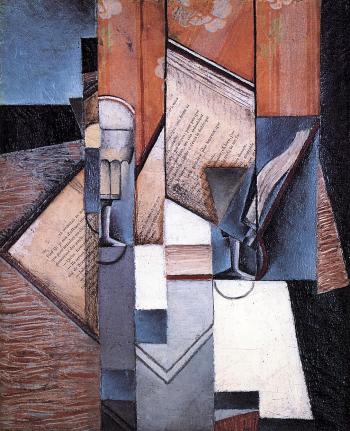
The Book
1913
Juan Gris
b. March 23, 1887
_______________________
The Poet
George Mackay Brown
Therefore he no more troubled the pool of silence
But put on mask and cloak,
Strung a guitar
And moved among the folk.
Dancing they cried,
'Ah, how our sober islands
Are gay again, since this blind lyrical tramp
Invaded the Fair.'
Under the last dead lamp
When all the dancers and masks had gone inside
His cold stare
Returned to its true task, the interrogation of silence.
_______________________
There are dimensions of difference undreamt of in non-ideal political theory. These are discovered, among other places, in ethnographic field work, in listening to people who do not set themselves up in society as theorists, who not only do not oppose the preeminence of Rawls but have no idea who he is, as they tell you their conception of the nature and sources of power or community. Those who are opening up political philosophy to include non-ideal theory still expect that we will be getting all of our ideas about the political from theorists of some sort or other, and that as such it is theory rather than expressions of culture that is of final interest to us.
For a Non-Ideal Metaphysics
Justin E. H. Smith berfois
(....)
It is not that I want us to apprehend the world in this way, and am wistful about what philosophy has moved away from. It is that we in fact do apprehend the world this way– perhaps not exactly in the way I’ve explained, but still in some way that is comparable. We are in fact constrained to apprehend the world as an inhabited, enchanted whorl of beings and forces and vibes good and bad, surely as a result of the way our cognitive apparatus has evolved, but surely no less vividly for that. Yet for the most part philosophy doesn’t care.
(....)
It is worth noting en passant that philosophers today are only prepared to scrap those products of evolved hyperactivity that it is socially feasible and morally expedient to scrap: out with the angels and poltergeists and God; but don’t worry, no one is going to come for your selfhood, or your private property, or your mid-sized physical objects, or your love. Of course these can be analyzed away too, if the mood hits us, but for the most part we will agree to keep them around, and even to theorize about them. One era’s specters to be shooed away are another era’s indispensable building blocks of social reality.
Cognitive science, and the philosophy influenced by it, has taken into account the richness I’ve been trying to evoke– that we are not just essentially thinking things, but also thinking things with, for example, a special evolved capacity to notice faces that appear in our natural landscape, and to have stronger reactions to them than to lumps of dirt. But cognitive science by itself is ill-equipped to draw out the full significance of the ineliminable features of human cognition that it registers and describes. Philosophers in other areas of specialization need to join the project.
...(more)
_______________________
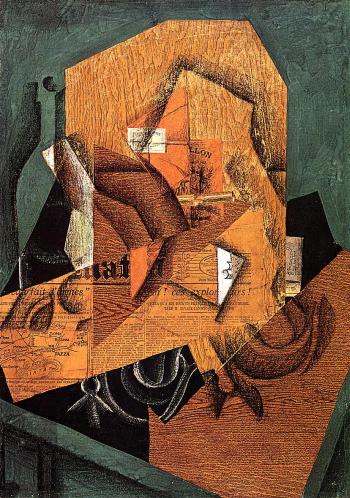
The Packet of Coffee
Juan Gris
1914
_______________________
Potentiality or Capacity?
Agamben's Missing Subjects
Nina Power
(....)
The last line of Bartleby the Scrivener: A Story of Wall Street may be "Ah, Bartleby!
Ah humanity!" but this is more like a sigh of despair than a radical loss presaging redemption,
political or otherwise. Is this all we can hope for? It is arguable that transformations in work and
the composition of labor have made older, classically Marxist analysis seem outmoded, or at least
in need of radical overhaul, but contemporary thought seems to have opted for two extreme
responses: the radically pessimistic (or minimalist) or the baselessly optimistic. If Agamben falls
into the former camp, then Hardt and Negri represent the latter with their concept of the multitude:
The contemporary cooperative productive capacities through which the anthropological
characteristics of the multitude are continually transcribed and reformulated, cannot help revealing
a telos, a material affirmation of liberation.
Just as it is altogether too quick to see the "material affirmation of liberation" in the exploitation
of basic human capacities in work, it is altogether too slow to see in the obstinacy of a Bartleby
the only response to sovereign domination. Agamben plays a central role in this recent
"minimizing" turn, turning to an older Aristotelian concept of "potentiality" to explore, albeit
paradoxically, the primacy of inactivity.
(....)
Whilst Agamben's position could be easily criticized from the standpoint of a more orthodox Marxism that would stress the historically conditioned nature of human potential and the necessity to think through forms of organization from within shifts in the nature of work, this is not the primary route this paper will take. In order to stay closer to Agamben's Aristotelianism, it is more productive to compare him to a thinker for whom questions of linguistic capacity and politics are also central, and also stem from a certain complex relation to naturalism, namely Paolo Virno. The paper will, via a reading of Agamben's Aristotelian conception of praxis and potentiality alongside Virno's work on the relation between language and labour, indicate the constitutive reasons why Agamben's notion of the subject as potentiality can only gesture towards collectivity and organisation, and why Virno's more nuanced conception of "capacity", which draws upon both rationalist and naturalist theories of the subject might form a more relevant alternative. It is by identifying the exploitation of those universal features of mankind, "the collective, social character which belongs to intellectual activity" as Virno puts it, that we can identify the possibilities for struggle inherent, yet not obvious, in the common. The struggle is no longer that of sovereign and subject, but of a different "constitutional principle": "the multitude does not converge into a volonté génerale for one simple reason: because it already has access to a general intellect." What Virno posits is a rethinking of human nature on the basis of "the history of capitalism." Agamben cannot fully perform this, despite gestures here and there towards an understanding of the historically specific nature of changes in exploitation of basic human capacities, because he cannot allow himself to admit any form of collective nature, however minimal, due to his Heideggarian suspicion of anything that looks like a philosophical anthropology, a humanism or a Marxism comprised of a theory of activity. Agamben's subjects are therefore 'missing' because he neither sees what it is in the human that is currently exploited, nor does he get beyond the Aristotelian-Heideggerian belief that inactivity is more important than action.
...(more) _______________________

Lonely Journey
1965
Hans Hofmann
b. March 21, 1880
_______________________
Dead Fires
George Mackay Brown
1921–1996
At Burnmouth the door hangs from a broken hinge
And the fire is out.
The windows of Shore empty sockets
And the hearth coldness.
At Bunertoon the small drains are choked.
Thrushes sing in the chimney.
Stars shine through the roofbeams of Scar.
No flame is needed
To warn ghost and nettle and rat.
Greenhill is sunk in a new bog.
No bending woman
Blows russet wind through squares of ancient turf.
The Moss is a tumble of stones.
That one black stone
Is the stone where the hearth fire was rooted.
In Crawnest the sunken hearth
Lit many a story-tranced mouth,
Old seamen from the clippers with silken beards.
The three-toed pot at the wall of Park
Is lost to woman’s cunning.
A slow fire of rust eats the cold iron.
The sheep drift through Reumin all winter.
Sheep and snow
Blanch fleetingly the black stone.
From that good stone the children of the valley
Drifted lovewards
And out of labour to the lettered kirkyard stone.
The fire beat like a heart in each house
From the first cornerstone
Till they led through a sagged lintel the last old one.
The poor and the good fires are all quenched.
Now, cold angel, keep the valley
From the bedlam and cinders of a Black Pentecost.
_______________________

The Open Window
Juan Gris
1921
_______________________
'Foreign to the resources of literature'
Steve Mitchelmore
This Space
(....)
The shock is a minor one and this is not a post to complain of its omission or to speculate on the competence of the judges – in 2013 the prize didn't go to Vila-Matas' sublimely light Dublinesque, so hope has long flown – and instead to wonder if the failure of such novels to walk away with such a title is a sign of the necessity and vitality of non-genre writing, in which form and content struggle into existence on their own merit rather than rushing to adopt a generic mould for safe passage, and that it is only committed amateurs on the sidelines, those not on a career path or with corporate sponsors to appease, who are able to subject themselves to the full force of writing as a presence in itself.
...(more)
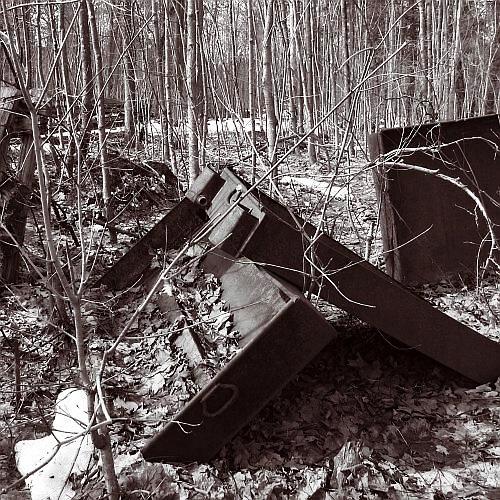
evaporating trays
photo - mw
_______________________
extracts from ‘A year in the forest’
Heikki Willamo
Translated by Hildi Hawkins
books from Finland
Spring
Staying put makes you notice slow changes. How snow melts and the pale forest floor gradually turns green. How the ice darkens and the edges of the ponds open up, how the meltwater grows around the stones in the water. When you have a base and a home, it becomes the centre of your existence and thus the focus of the whole forest. Unhurried sitting, making food, brewing coffee and sleeping with open senses brings the life that surrounds you under your skin.
(....)
I begin to call my space metsänpeitto, forest cover. Once, it was something frightening, in which you became the prisoner of the forest and its supernatural powers. You found yourself in an unfamiliar state of being and could not contact anyone who was trying to find you, even if they walking beside you. They, on the other hand, saw you, under your forest cover, as a stone or a tree-stump and could not hear your cries for help. The world changes, beliefs and myths crumble as things receive their explanations. I am not forced under the cover of the forest; it is a privilege to be there. For me it is a tranquil, place that simplifies and clarifies things....(more)
_______________________

photo - mw
_______________________
Dreamwood
Adrienne Rich
In the old, scratched, cheap wood of the typing stand
there is a landscape, veined, which only a child can see
or the child's older self, a poet,
a woman dreaming when she should be typing
the last report of the day. If this were a map,
she thinks, a map laid down to memorize
because she might be walking it, it shows
ridge upon ridge fading into hazed desert
here and there a sign of aquifers
and one possible watering-hole. If this were a map
it would be the map of the last age of her life,
not a map of choices but a map of variations
on the one great choice. lt would be the map by which
she could see the end of touristic choices,
of distances blued and purpled by romance,
by which she would recognize that poetry
isn't revolution but a way of knowing
why it must come. If this cheap, mass-produced
wooden stand from thc Brooklyn Union Gas Co.,
mass-produced yet durable, being here now,
is what it is yet a dream-map
so obdurate, so plain,
she thinks, the material and the dream can join
and that is the poem and that is the late report.
Adrienne Rich at the Poetry Foundation and PennSound
_______________________
Alone here
Gösta Ågren
Translated by David McDuff
Books from Finland
(....)
THE SEEKING
He seeks in his life,
but finds only
his life. All that is used
becomes an object, even
a life. Helplessly he leafs through
the unwritten book.
Midway in the night he wakes up. Dark
sentinels surround the bed;
in vain he spreads
his wings. To use life
is to deny it. He lights
the candle’s white salt, but sees
with his eyes closed, listens
with open hands. The years
darken. Someone is approaching
in the gloom; a being
is leaving its source. The time
has come. The time
has always come.
...(more)
Introduction by Erkka Lehtola
_______________________

photo - mw
_______________________
Losing our Fear! Facing the Anthro-Obscene
Erik Swyngedouw
The hegemonic liberal frame that sutures the environmental literary landscape today is ‘market environmentalism’. Greening the market economy, so the fantasy goes, is systematically advanced across the academic and popular media landscape as the panacea for the environmental deadlock we are in. The dominant argumentation of ‘green economy’ pundits maintains that merely greening the existing socio-economic relations will bring a sustainable solution. Ecologising the economy would be necessary and sufficient to evade a pending ecological Armageddon while permitting the untroubled continuation of civilisation as we know it for a while longer.
It is precisely the premise of this biblical promise of an ecological catastrophe coming near you in the near future that should be rejected completely. Confronted with cataclysmic images of imminent ecological disaster, which predominate the ecological and climate discourse and imaginary, and whose ultimate goal is precisely to make sure that the disaster does not take place (if we take the right measures), the only correct radical answer seems to be ‘don’t worry’ (Al Gore, Prince Charles, green boys and girls, eco-responsible companies, environmental civil servants), your disaster scenario is factually correct, but just a bit out-of-synch; social-ecological Armageddon will not only take place, it is already taking place, it has already happened. Many already live in the apocalypse, in those places where the intertwining of environmental change and social conditions has already reduced living conditions to ‘bare life’. Socio-ecological entanglements have already reached the ‘point of no return’. It is already too late to do something about nature. It has always already been too late. It is precisely by accepting this reality that a new politics can emerge.
(....)
... There is no longer a form of Nature that is not influenced by social, cultural, and economic relations. Henrik Ernstson, eminent political ecologist, recently proffered the term ‘Anthro-Obscene’ to signal the starkly de-politicising and plainly disempowering mobilisation of what nonetheless sounds like a revolutionary concept. Is the ‘Anthropocene’ and its intense human – non-human entanglements not precisely the name for the disavowed historical unfolding of the capitalist political ecology of the past few centuries? Has it not been the historical-geographical dynamic of capitalism and its global spread that has banned the very existence of an external nature?
...(more)
ENTITLE bloga collaborative writing project on Political Ecology
via synthetic_zero_______________________

The Boats And The Iron Ladder
1947
Patrick Heron
d. March 20, 1999
_______________________
'Different Stories' from 'As Luck Would Have It'
Mark Weiss
presented by Jerome Rothenberg
1
The man who lives in boring times
bucket by bucket moves a mountain.
Wedded to the trajectory,
a collection of shattered lenses,
a matrix of rituals.
Man, or machete.
A catalogue of expectations.
Cutlass, for instance,
the brute violence of the toolshed
become a scimitar in the hands of pirates.
(....)
3
Failure to make circles.
Old age, as the young man assured me,
is a state of mind.
In the order of things
there will be fire.
Ownership of islands will be swept by the sound
and all these wetlands.
This has been home
and this has been home
and this has been home.
Much of what you plan for
won’t happen, and what does
you’ll be unprepared for.
Following beasts,
elk and elephant providing wisdom.
“Where grass is good
there will be meat.”
“Salt is aggressive
and rises to water.”
...(more)
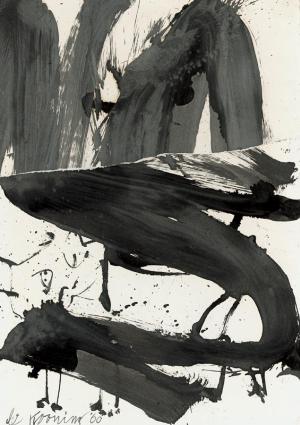
Willem de Kooning
d. March 19, 1997
_______________________
Sitting On an Airplane, a Mule
Lauren Berlant
berfrois
1.
I am reading other people’s work during a long travel corseting. Much of it is interesting and plausible: I try, it tries. I feel dull toward it, pickled.
Most of the writing we do is actually a performance of stuckness. It is a record of where we got stuck on a question for long enough to do some research and write out the whole knot until the original passion and curiosity that made us want to try to say something about something got so detailed, buried, encrypted, and diluted that the energetic and risk-taking impulse became sealed and delivered in the form of a defense against thinking any more about it. Along the way, something might have happened to the scene the question stood for: or not.
2.
I never fall out of love, but run out of gas. That’s what I mean by thinking as a transformation within stuckness. All the noise of research and explanation gets created to materialize the thickness of an interest; the noise circles around its object and barely, usually, congeals the force to move it anywhere, although sometimes it does. The thought is never finished—in Deleuzean terms, the problem-event that governs the situation is in potential–but what I’m talking about in the finishing is something else, the movement within stuckness between making an opening and defending against so much of that which spikes out from the openings one makes until the thing has to be relinquished and moved into the world.
...(more)
_______________________

Willem de Kooning
_______________________
The Algorithmic Self
Frank Pasquale
The Hedgehog Review: Vol. 17 No. 1 (Spring 2015)
(....)
To negotiate contemporary algorithms of reputation and search—ranging from resumé optimization on LinkedIn to strategic Facebook status updates to OkCupid profile grooming—we are increasingly called on to adopt an algorithmic self, one well practiced in strategic self-promotion. This algorithmic selfhood may be critical to finding job opportunities (or even maintaining a reliable circle of friends and family) in an era of accelerating social change. But it can also become self-defeating. Consider, for instance, the self-promoter whose status updates on Facebook or LinkedIn gradually tip from informative to annoying. Or the search engine-optimizing website whose tactics become a bit too aggressive, thereby causing it to run afoul of Google’s web spam team and consequently sink into obscurity. The algorithms remain stubbornly opaque amid rapidly changing social norms. A cyber-vertigo results, as we are pressed to promote our algorithmic selves but puzzled over the best way to do so.
This is not an entirely new problem: We have always competed for better deals, for popularity, for prominence as an authority or a desirable person. But just as our metabolic systems may be ill adapted to a world of cheap, hidden sugar, the social cues and instinctive emotional responses that we’ve developed over evolutionary time are not adequate guides to the platforms on which our algorithmic selves now must compete and cooperate. To navigate them properly, we need the help of thoughtful observers who can understand today’s strategies of self-making within a larger historical and normative context.
...(more)
_______________________
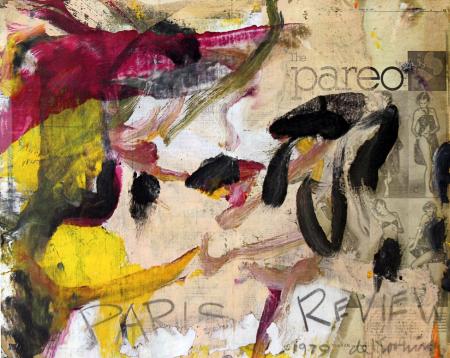
Willem de Kooning
_______________________
Zombie Apocalypse as Mindfulness Manifesto (after Žižek)
Chris Goto-Jones
Postmodern Culture Volume 24, Number 1
(....)
Of course, it is not the case that the mindfulness movement demonizes all thought, only certain types of thought that involve cycles of rumination. Mindfulness training generally takes the form of therapeutic interventions designed to transform our patterns of thought. While the idea that particular styles of thinking can be pathologized with political significance evokes the controversial anti-psychiatry movement, one of the particular characteristics of the mindfulness movement is that it does not target an ostensibly deviant minority of individuals for “correction” by authority, but instead asserts that it is the majority that is somehow muddle-headed and sick. The hegemonic discourse is the source of toxicity rather than the basis for rectification. In this case, the political relations implied by the therapeutic model are not the personalised power-relations of the centre and periphery of society (or even relations between state and society) as suggested by the anti-psychiatrists, but rather the disjunction is between the material conditions of capitalism and the psychic conditions of humanity in general: with a few exceptions, we are all muddle-headed about how to live in capitalism in a healthy way. The mindfulness movement seeks to reveal and resolve a kind of false-consciousness generated by the dynamics of capitalism itself.
One of the difficulties of this situation which has not been adequately addressed by the “movement” concerns the political meaning and significance of this (r)evolutionary, therapeutic agenda. To some extent, this question has simply not been asked because of the movement’s focus on therapeutic efficacy for individuals. At the very least, the movement suggests two political positions: the first is that mindfulness enables a form of genuinely healthy authenticity that emancipates people from the suffering foisted upon them by capitalism (even while leaving the structures and institutions of capitalism materially untouched); the second is that mindfulness functions as a form of secular religion within capitalism – a contemporary opiate for the people – serving as a new form of ideological domination that enables people to endure the alienating conditions of capitalism without calling for material revolution, redistribution, or institutional change.
This essay is a playful attempt to explore the terrain outlined by these two interpretations, utilizing the imaginary contrast between the mindful meditator and the mindless zombie. In the end, the image of the zombie apocalypse emerges as an ironic manifesto for the mindfulness movement in capitalist societies. _______________________

Willem de Kooning
_______________________
Voices of the Ordinary; A Brazilian Song
Carl E. Kandutsch
ctheory
"Uttering a word is like striking a note on the keyboard of the imagination."
Ludwig Wittgenstein, Philosophical Investigations
I. Prefatory remarks: The occasion of this essay
This article will have succeeded in achieving its purpose to the extent that it accurately accounts for the occasion of its writing. It is not written to prove or argue a point, to uncover new evidence, to elaborate a new theory, or even to intervene in any ongoing conversation concerning music, ordinary language philosophy, aesthetics, or any other current topic of which I am aware. This writing aspires to the condition of philosophy in the sense that it seeks to articulate the conditions that underlie its production. More specifically, the writing is occasioned by an intuition responding to a particular song, and its purpose is, to paraphrase Emerson, to suggest a tuition for that intuition; in other words, to test the validity of the intuition by outlining terms of criticism for what may be heard in the song.
The song is called "Diariamente" in Portuguese, which can be translated into English as "Everyday," or "Daily." It represents an instance of contemporary "musica popular brasileira" or "MPB," written by Nando Reis (born 1963), formerly the bassist and lead singer of the rock band Titas. In this essay I focus on a live performance in 1995 by Marisa Monte, which can be viewed online at https://www.youtube.com/watch?v=873oaywNJws.
...(more)

Pawel Pierściński
_______________________
There’s Only Bricolage
Larval Subjects
(....)
There’s only bricolage. This is attested to in all dimensions of nature. The species that manage to survive are products worthy of Frankenstein, cobbled together on the platforms of previous species, as well as sequences of DNA that were exchanged from species to species by viruses. Their parts never quite work together as we can see in the case of human child birth and the appendix. The grape of the wine is a product not simply of DNA or a master-plan, but of other plants growing in the environment, weather conditions, soil nutrients, water contents, insects, and so on. Grape genes of identical genetic stock nonetheless differ significantly from one another from year to year. The brain is a plastic system with neurons that link to one another as a function of thought, experience, encounters, nutrients, and many other things besides.
Why should thought and theory be any different? Your fidelity to a particular thinker as a scholar, your commentary and scholarship? That was the result of countless encounters you had with the work of other thinkers and scholars, your experiences, snippets of things you heard and saw, a text here and there, and so on. You thought you were getting at the truth of Heidegger? Maybe. It’s more likely that you cobbled together odds and ends in your garage as a result of what was available. Your deductive rigor from a single premise according to the laws of logic? The same. You were just Frankenstein sewing together parts of bodies in your lab. That work that describes itself as “rigorous” is not the absence of the sloppiness of the bricoleuer, but rather a failure to recognize the soil within which it grew. It is the grape that says “I, an I alone, in contrast to all other grapes, am the grape that completely grew and defined myself!”
But this is always a lie, even for the mathematician. There’s always an aleatory multiplicity that rumbles beneath any Apollinian order. There is no being, no thought, no theory that isn’t cobbled together from the materials one finds in her garage...(more)
_______________________

Pawel Pierściński
_______________________
Death(s) in Venice:
Bodies and the Discourse of Pollution From Thomas Mann to Porto Marghera
Serenella Iovino
This discourse is part of my current book project. Titled
Ecocriticism and Italy: Ecology, Resistance, and Liberation, the book attempts to collect the “material stories” of some particularly dense places in Italy as segments of the vast ecological and ecocultural horizon of this country. The idea is that, in this (local) scenery of (global) crisis, literature and critical practices enact forms of ecologi-cal resistance and cultural liberation. _______________________
The White Review March 2015
Climate Science As Sensory Infrastructure
Mckenzie wark
WELCOME TO THE ANTHROPOCENE, that planetary tempo in which all the metabolic rhythms of the world start dancing to crazy new tunes. Sure, you can join the Heideggerians and blame western metaphysics for all this. You could put it down to Walter Benjamin’s angel of history. Or, perhaps it is time to find some new characters to talk about, and new objects of thought. Maybe critical writing could get its head out of the cloudy superstructures and think again about this base and vulgar world.
The problem with the traditional humanist disdain for science and technology is that it is now a line of thought pursued most vigorously again by reactionaries and fascists. If you want to accept the reality of climate change, that most awkward rift in the planet’s metabolism, then that means accepting the science on which it is based. Accepting the science, it turns out, means relying on a particular kind of infrastructure that produces it.
Perhaps it is time then to turn to a kind of critical theory that was particularly interested in infrastructures, in technologies, and in sciences. For example: let’s talk about Alexander Bogdanov. ...(more)
_______________________
Rethinking the Biopolitical Turn
From the Thanatopolitical to the Geneapolitical Paradigm
Video of Chiara Bottici's General Seminar Lecture
Bottici ranged broadly, moving between ancient and contemporary usages and practices. She provocatively proposed that politics as a set of practices, and not as a science, is a modern creation. She maintained, further, that biopolitics has been conceived in death and speculates what would happen if it was imagined in the terms of birth. She proposes, as I understood her, a radical feminist account of the biopolitical, very specifically beyond Foucault and those who have been informed by his path breaking work. The discussion following her elegantly presented lecture was very much in the tradition of the General Seminar: critical, passionate, informed by history and interdisciplinary. In the new tradition of Public Seminar, it simultaneously addressed pressing contemporary problems and enduring problems of the human condition.
_______________________
Death of the PostHuman: Essays on Extinction, Vol. 1
Claire Colebrook
open humanities press
Death of the PostHuman undertakes a series of critical encounters with the legacy of what had come to be known as 'theory,' and its contemporary supposedly post-human aftermath. There can be no redemptive post-human future in which the myopia and anthropocentrism of the species finds an exit and manages to emerge with ecology and life. At the same time, what has come to be known as the human - despite its normative intensity - can provide neither foundation nor critical lever in the Anthropocene epoch. Death of the PostHuman argues for a twenty-first century deconstruction of ecological and seemingly post-human futures.
Sex After Life: Essays on Extinction, Vol. 2
Claire Colebrook
Sex After Life aims to consider the various ways in which the concept of life has provided normative and moralizing ballast for queer, feminist and critical theories. Arguing against a notion of the queer as counter-normative, Sex After Life appeals to the concept of life as a philosophical problem. Life is neither a material ground nor a generative principle, but can nevertheless offer itself for new forms of problem formation that exceed the all too human logics of survival.
_______________________
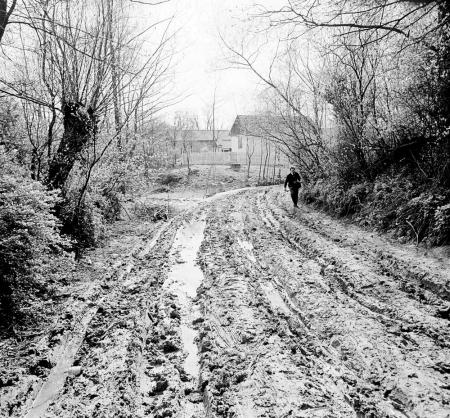
Pawel Pierściński
_______________________
I’m Very Into You – Kathy Acker & McKenzie Wark
reviewed by Hestia Peppe
full stop
I’m Very Into You archives and offers up an email exchange taking place over some two weeks in 1995 between the writer Kathy Acker and media theorist McKenzie Wark. Their exchange constitutes a negotiation of the emotional, political, textual, digital, and physical territories that lie between the two of them following a three-night stand in Sydney. The first fragile emails are sent from the depth of “compound hangovers” and in Acker’s case, jetlag. From what follows emerges an ever-surprising epistolary interrogation of the possibility and recognition of the “radical difference” between one and other.
Publishing an email exchange brings about various important confusions — or to borrow a phrase from Wark — “slippages” — which Acker, with her notorious love of puns, picks up. This idea runs through I’m Very Into You, back and forth between them; a point of known unknown which is returned to again and again.
...(more)

photo - mw
_______________________
If grief smoked
Eeva-Liisa Manner
Poems from six collections of poetry.
Translated by Herbert Lomas
Books from Finland
(....)
A strange grieving in the forest –
while the village is sleeping.
A strange feeble grieving
like a child weeping.
You open the door. You listen. Nothing.
You close the door. It’s there again.
Who’s lost in the dark?
Who’s been abandoned?
Who are they drowning somewhere?
A strange long grieving
as if a memory were weeping, or a shadow, or an echo –
right across the lake.
...(more)
.....................................................
Why translate?
Herbert Lomas
_______________________
What Is Called History at the End of Modernity? (Part III)
James Livingston
(....)
Like John Jeremiah Sullivan and Walter Johnson, and all other writers committed to the notion that there is no difference between past and present—it’s an exhausting imperative—Faulkner sometimes expresses impatience with his own rhetorical strategies: he “breaks,” as actors say, from the characters he has established as the narrators of this story. He pronounces from offstage, so to speak, in an authorial voice. In Absalom, Faulkner gives these exasperated, explanatory, metanarrative lines to Aunt Rosa Coldfield as well as old Compson:
“’Once there was—Do you mark [how] the wisteria, sun-impacted on this wall here, distills and penetrates this room as though (light-unimpeded) by secret and appetitive progress from mote to mote on obscurity’s myriad components? That is the substance of remembering—sense, sight, smell: the muscles with which we see and hear and feel—not mind, not thought: there is no such thing as memory: the brain recalls just what the muscles grope for: no more, no less: and its resultant sum is usually incorrect and false and worthy only of the name of dream.’”
Sudden oracular exclamations like this are scattered throughout the dense thrumming of words that is Absalom, where the weight of the past registers as a genetic trait, a natural fact, a physical burden—“not mind, not thought”—as well as a psychic wound, probably because Faulkner himself knew that from time to time he had to find a verbal clearing, for himself and his readers, where they could rest, sip some water, then get on with his merciless, clear-cutting journey into the darkness at the heart of the American Dream.
...(more)
_______________________
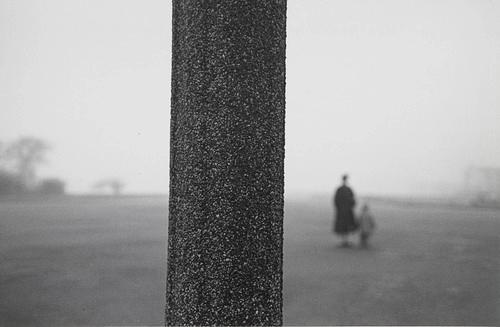
Eleanor and Barbara
c. 1953
Harry Callahan
d. March 15, 1999
_______________________
Afterword: The Death Of The Translator
George Szirtes
the white review
1.
The translator meets himself emerging from his lover’s bedroom. So much for fidelity, he thinks.
2.
Je est un autre, said the translator. Try next door.
3.
The translator was looking down his own throat. Come out, come out, wherever you are! he pleaded.
The translator’s wardrobe was full of other people’s shirts. At least they fitted him.
The translator stood in front of the window pretending to be transparent.
But if everything is potentially everything else, complained the translator, what am I doing here?
The translator was counting his chickens, none of them hatched but already squabbling.
4.
The translator wanders into Babel and books himself into a cupboard.
Two languages on the same floor of Babel. – I was here first. – I’m not talking to you. – Keep the music down. – You call that music?
But the gardens of Babel? Who talks about them? Who planted them? Who tended them? cried the translator in his cups, slurring his words.
...(more)
_______________________

Harry Callahan
_______________________
Bright, Dusky, Bright: Translating Eeva-Liisa Manner
Emily Jeremiah
the Finnish-English Literary Translation Cooperative
Theorem
Let prose be hard, let it provoke unease.
But the poem is an echo that is heard when life is mute:
shadows gliding on mountains; the image of wind and cloud,
the passage of smoke or life: bright, dusky, bright,
a river flowing silent, deep cloudy forests,
houses mouldering slowly, lanes radiating heat,
a worn-down threshold, the stillness of shadow,
a child’s timorous step into the darkness of the room,
a letter that comes from afar and is pushed under the door,
so big and white that it fills the house,
or a day so stiff and bright that you can hear
how the sun nails shut the abandoned blue door.
The poems of Eeva-Liisa Manner (1921–95) are lucid yet mysterious. They are haunted by echoes, steps, shadows, reflections; but they evoke ghostliness with utter clarity. I wanted to translate ‘Theorem’ because as well as being characteristic of Manner’s oeuvre in terms of its style and imagery, it offers an aesthetic manifesto, a ‘theorem’ pertaining to poetry. I am also motivated by the fact that Manner’s work is shamefully little known outside of Finland.
...(more)
|








































